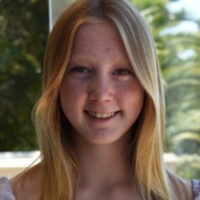Is water wet? Oxford Languages defines wet as, “covered or saturated with water or another liquid.” It seems evident that what creates something wet is water, so water itself must be wet. However, an alternative proposal that I have pondered throughout my life is that a state of wetness is only based on a comparison to dryness. If a salmon constantly exercises its fins in the Pacific Ocean, adding more seawater will not make the salmon feel more wet as it swims. Similar to how a nerve will not fire if the neural stimulation threshold is not reached, the fish will not perceive changes to its wet state unless it experiences being dry, perhaps by leaping out of the ocean.
What is life if not for comparison? I strive to discover what it means to be wet, or really what it means to be anything. Perspective is the key to my predicament. I have an extensive background in chemistry, so I decided to explore the meaning of life at the molecular level. Lake Superior is a body of water. Zooming in to a microscopic view of the lake, we can see individual molecules of H2O surrounded by other water molecules. Water molecules are wet since they have water on and around them, but the lake in its entirety is not wet since water is simply its identity. Viewing the world from various perspectives profoundly changed my sense of what is valuable. Consider a $10,000 bonus to a Tesla employee. This would be quite the accomplishment for the employee, an apparent change from dry to wet. However, if CEO Elon Musk receives the same amount, he may feel like the salmon constantly swimming, since a mere $10,000 in comparison to his $188 billion net worth is below his threshold of wetness. Yet, if $10,000 was below everyone’s threshold, nobody would fill lower-paid job sectors, limiting everyone’s quality of life. Thus, I discovered different thresholds for a sense of accomplishment, or a perceptible feelings of wetness, enable individuals to discover their unique place in an immense world. It was now my time to discover my unique place in an immense world.
We can spend our lives going through the motions of what is expected of us, simply checking the boxes of what will get us into our “dream” college or “perfect” job, but what is the real reason for those goals? I contemplated whether to continue on a path to medical school, or continue on with chemistry research. I asked myself, is developing a vaccine meaningful to a researcher? When the researcher realizes his experiment proved successful, he may feel wet due to the apparent change from his dry, unsuccessful past. The source of this wet, or excited, feeling may be because he knows the vaccine will save lives, or simply because it was a personal accomplishment. Still, another individual’s perceptible feeling of wetness may only come if he himself injects the COVID-19 vaccine into the immunocompromised patient, an act above his threshold defining meaning. I had to ask myself if I would be satisfied with the development of healthcare technology through chemistry, or if I would need to actively participate in healing a person through surgery. I was on my quest to find what was above my threshold for making my life meaningful. We must all ask ourselves what a true change is from wet to dry!
Recently I found myself spending 100 hours in a chemistry laboratory, all to discover whether one technique of titration of chloride ions was better than another technique. This was a monotonous task, delivering drops of silver nitrate titrant to a small beaker for hours on end, waiting desperately to perceive a color change. At times, it seemed that my eyelids grew heavy in the hours of adding silver nitrate, feeling as if the color would remain unchanged for millennia. The data collection felt dry, with little sense of accomplishment. However, when compiling the discussion section of my paper for publication, I had to compare the techniques of titration. The 2nd technique using chromate dichromate was highly toxic. It was at this moment that I discovered my source of wetness. I recorded a video to share with an educational journal urging the use of the dichlorofluorescein technique to be introduced to highschool laboratories. Suddenly I was less focused on publishing my extremely technical work. Water rushed into the laboratory, I plunged into the ocean with the pink salmon, I leapt into Lake Superior, I was drenched from head to toe. I made a difference in the lives of youth, I could foster a love for chemistry, I could unlock the world of scientific inquiry for the minds of the future. Suddenly my laborious work in the lab had purpose. Through pondering meaning in life, I discovered wet can only be defined in terms of what is dry. Water is indeed wet if it is on something that is dry, but perspective is required. We must take a moment to evaluate our multitude of endeavors and search for what brings us the most fulfillment, for we are wasting time drowning in activities that may impede upon the richness of life.
Quinn Campbell currently resides in San Diego, California. When not contemplating philosophy, she enjoys walking her dog Gracie on the beautiful local beaches.






















